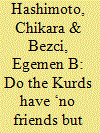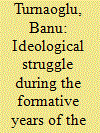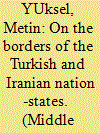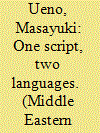|
|
|
Sort Order |
|
|
|
Items / Page
|
|
|
|
|
|
|
| Srl | Item |
| 1 |
ID:
146799


|
|
|
|
|
| Summary/Abstract |
A Kurdish proverb says that the Kurds have ‘no friends but the mountains’. This was not what the Turkish authorities believed. Using new and previously unexploited archives both in English and Turkish, this article offers a new interpretation of Turkey's perception of the Kurds. By analyzing Kurdish activities and their alignment with Communist movements and Soviet activities, it shows how Turkey's threat perception was shaped by international contexts, especially through the Cold War. In addition, the Kurdish nationalist movement in the Middle East played a pivotal role in regional intelligence cooperation between Turkey, Iraq and Iran. This article argues that Soviet and Communist activities had an important role in shaping Turkey's threat perception of the Kurdish minority in the country. Turkey's perception of subversive threats involved an intertwining of Communists, Soviets and Kurds. This affected the Kurdish bid for independence for most of the twentieth century.
|
|
|
|
|
|
|
|
|
|
|
|
|
|
|
|
| 2 |
ID:
146795


|
|
|
|
|
| Summary/Abstract |
This article mines an early history of modern Lebanon by placing a special focus on the country's Jewish community and examining inter-Lebanese relations where Lebanese Jews take centre stage. Like Lebanon's Christians – Maronites in the main – Lebanon's Jews reveal themselves to have played an important role in the establishment of the Lebanese republic as a ‘confederation of minorities’. But the role of Lebanese Jews was a discreet, low-pitched one, and their ‘voices’ and ‘stories’ seem to have been left out of traditional history books. This article is an attempt at correcting a lacuna of exclusion vis-à-vis Lebanese Jews, mending their memory and restoring them to their rightful place as a foundational element of modern Lebanese history and socio-cultural production.
|
|
|
|
|
|
|
|
|
|
|
|
|
|
|
|
| 3 |
ID:
146801


|
|
|
|
|
| Summary/Abstract |
The meaning of republicanism in Turkish political thought is unclear. It has been viewed as a force for modernization and secularization that reached its apotheosis in the Republic founded by Mustafa Kemal. Another widely accepted scholarly view is that the Turkish Republic and its ideology, Kemalism, emerged abruptly in 1923 without any intellectually substantial foundation. This article challenges these views and demonstrates, by contrast, that it is a mistake to understand Turkish republicanism exclusively in Kemalist terms. In the formative period of the Republic (1922–24), its intellectual founders crushed all contesting and rival political viewpoints. The new state's foundational ideology was the sole victor among competing conceptions of Islamic and liberal republicanism. Modern-day Turkish republicanism represents the outcome of centuries of intellectual dispute between these conceptions.
|
|
|
|
|
|
|
|
|
|
|
|
|
|
|
|
| 4 |
ID:
146800


|
|
|
|
|
| Summary/Abstract |
Following the First World War, empires were replaced with nation-states for good and the map of the Middle East was redrawn. Traced back to the final decades of the nineteenth century, Kurdish nationalism did not result in a nation-state in the modern Middle East. Therefore, the Kurds inhabiting the borderlands of the four nation-states of Turkey, Iran, Iraq and Syria came to be perceived as ‘trouble’ by these nation-states. Through the use of a wide array of published and unpublished Kurdish, Turkish, Persian and French archival documents, memoirs and oral and written literary pieces, this article unearths the role of a Kurdish tribal chief by the name of Ferzende in Mount Ararat Revolt in the late 1920s and early 1930s against the Turkish and Iranian nation-states. An exceptional contribution of this study is its exploration of the petition submitted to the Iranian Parliament by Ferzende's wife Besra. This study thus is a fresh contribution to the study of social history of the Middle East from the margins.
|
|
|
|
|
|
|
|
|
|
|
|
|
|
|
|
| 5 |
ID:
146798


|
|
|
|
|
| Summary/Abstract |
Changes in gender roles are related to larger developments in the spheres of social modernization and discipline. As Ottoman society evolved into a nation through the nineteenth century, women's roles in contemporary epic literature were reassigned to domestic life, showing them protecting the hinterland and nurturing younger generations in order to satisfy the state's growing need for manpower. Gradually, Ottoman women lost whatever autonomy they may have had over their bodies, and their status vis-à-vis the state was redefined. This article examines the female characters in modern Ottoman epic literature so as to explore the reflections in this literature of the social and political transformations that occurred during the last quarter of the nineteenth century. It aims to reveal the ways in which heroic female figures created before or at the beginning of the autocratic reign of Abdülhamid II (r. 1876–1909) changed into domestic characters as the social skeleton of the regime became apparent.
|
|
|
|
|
|
|
|
|
|
|
|
|
|
|
|
| 6 |
ID:
146797


|
|
|
|
|
| Summary/Abstract |
This article focuses on the publications of Garabed Panosian and examines the extent of readership achieved by the Armeno-Turkish newspapers in the nineteenth-century Ottoman Empire. It specifically focuses on the linguistic, social, and political circumstances in which his newspapers were read. The readership of Panosian's newspapers was not only limited to Turkish monolingual Armenians but also extended to Armenian--Turkish bilingual Armenians. Moreover, his newspapers, along with other Armeno-Turkish materials, gained a non-Armenian readership. Thus, Panosian was able to use his newspapers to display the allegiance of Armenians to the Ottoman Empire, aiming at a favourable evaluation from government circles. Besides being a tool to reach out to Turkish monolinguals, Armeno-Turkish newspapers were also rich products of the culture of bilingualism and a medium shared by religiously diverse people. Thus, examining Armeno-Turkish materials elucidates the pluralistic society of the late Ottoman Empire.
|
|
|
|
|
|
|
|
|
|
|
|
|
|
|
|
| 7 |
ID:
146802


|
|
|
|
|
| Summary/Abstract |
Cemevis emerged as the spaces of the Alevi identity in contemporary cities of Turkey. On the basis of in-depth interviews conducted in İzmir with the heads of cemevi associations, this study claims that, while cemevis were enforced by the process of urbanization, they have been transforming the Alevi practices and collective organizations and eventually constructing a new type of Alevism as to religious practices, community institutions and collective imagination. Though no legal–political recognition has yet been granted to cemevis as the places of worship, they have established themselves as central institutions of urban Alevis with their extensive use beyond the limited oppositional categorization of culture–religion. This denial of legal status which has been seen as the violation of basic human rights is one of the main constitutive dynamics in the ongoing debates on Turkey's Alevi question. It is to such an extent that the denial of legal status to cemevis has today come to be identified by Alevi groupings with the denial of Alevi collective identity itself.
|
|
|
|
|
|
|
|
|
|
|
|
|
|
|
|
| 8 |
ID:
146796


|
|
|
|
|
| Summary/Abstract |
This article focuses on the visual privacy rights as practised in the urban settings in the late Ottoman Empire (1850–70) and in contemporary Turkey (1980–2010). The analysis draws on the detailed examination of the legal conflicts on the overlooking windows between neighbouring houses in both periods. A hundred legal cases from the Ottoman context and 35 parallel cases from the last decades in Turkey were covered to understand the everyday practices of visual privacy and to compare them with the official privacy rules in the Ottoman and Republican contexts. First, the cases suggest that even today many citizens, including some lower court judges, confidently defend the urban right to be unseen from the neighbour's window despite the contrary decisions of the Supreme Court. Second, the in-depth analysis of the window-conflicts showed that the radical separation of the material world from the human world in both Islamic law and the Republican Civil Law was challenged by popular claims to visual privacy thanks to their exclusive focus on windows. It is argued that popular privacy rights were not about individual private space but about the urban built environment. Hence, windows were targets of the claims of the right to the city.
|
|
|
|
|
|
|
|
|
|
|
|
|
|
|
|
|
|
|
|
|